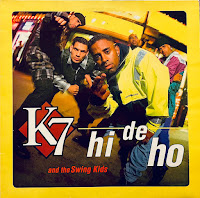— Pete Stanton
The St. Louis Blues are a club in the National Hockey League. They are best known to me as the organization that seemed to always get fleeced in trades with my favourite team the Calgary Flames but they also always used to be perennial dark horses, the sort of club that you would predict to do well in the playoffs because you were sick of it always being Colorado or Detroit or "Jersey", the hockey team which is evidently based in the tax haven Channel Island.
Another thing I know about this hockey team from Missouri is that a number of years ago they were struggling with choosing a new theme song for when the players skate onto the ice or score a goal or win a game or whenever a streaker runs across the ice. Yes, that's right: a club named after a classic blues number by W.C. Handy and recorded by the likes of Bessie Smith and Louis Armstrong (among others) needed a new theme song. You just can't make this stuff up.
This is where Cab Calloway is especially missed. He would have thought nothing of recording a fresh and contemporary version of "St. Louis Blues" for the mid-western hockey team just as he had with his signature "Minnie the Moocher" for a disco audience at the end of the seventies. Just as, in his frail state in the last months of his life, he made a cameo in the video for "Hi De Ho", the latest single from hip hop combo K7 & The Swing Kids.
Already having scored a Top 5 hit with "Come Baby Come" which was catchy and loads of fun, K7 seemed like the sort of hip hop act that would be one and done — and they just about were. The only thing that prevented them from being forever remembered as one-hit wonders (aside from the fact that it's a category that is only ever reserved for groups on the American Hot 100; anyone who only managed that solitary smash in another country need not apply) was the British being such unabashed suckers for the novelty song. Plus, there must have been a curious nostalgia for olde school jazz beats at the time: "Hi De Ho" was released hot on the heels of "Doop" and several months' before Scatman John's uber-annoying hits "Scatman (Ski-Ba-Bop-Ba-Dop-Bop)" and "Scatman's World".
Yet, it would be wrong to accuse K7 of bandwagon jumping. He had already put out album Swing Batta Swing, which included "Hi De Ho", in the latter part of 1993, so he couldn't have been aware of those Dutch DJ's who looked to revive the charleston in techno form. (The real inspiration may have been Guru's Jazzamatazz Volume 1, though it was a much more classicist work right down to the sleeve aping those "iconic" Blue Note covers) More to the point, there's nothing remotely gimmicky about this single. It's as if scat had been a predecessor of rap or something. Oh wait! That's exactly what it was!
This was a point which eluded the Cosby kids whenever Cliff Huxtable would admonish Denise, Theo, Vanessa and Rudy for their penchant for hip hop over jazz. What they should have told them (aside from insisting that he refrain from drugging and sleeping with so many women) was that the scatting that he no doubt loved was not unlike like the verse from the streets that they enjoyed. It may not have been quite as improvised — at least not by the nineties; early rap was built on MC's being able to cut impromptu vocal poetry — but then again, scatting itself had become a neutered art form with recording technology. Do you really think Dizzy Gillespie's jibber-jabber varied much from night to night?
Just a week on from listing off the various rap numbers that have come up on this blog and we've already got another (it's almost as if hip hop was becoming more popular or something). I'm in no hurry to provide an update but I will say that "Hi De Ho" takes a deserving spot alongside the likes of Run-DMC, Dream Warriors and Arrested Development — and it's streets ahead of the do gooder nonsense from Credit to the Nation. I'm not sure I'm quite as taken by it as Pete Stanton but he's not wrong. Spirited, oodles of panache and just the sort of thing that might have encouraged a few kids out there to dig out their dad's copy of Dave Brubeck's Time Out or their grandpa's Benny Goodman at Carnegie Hall? My dad and grandpa didn't have those records, mind you, but I wasn't really into K7 either. More fool me.
~~~~~
Also Reviewed This Fortnight
Bruce Springsteen: "Streets of Philadelphia"
This powerful film was beginning to draw to an end when I realised that virtually everyone else I was with was in tears. Sniffs and sobs surrounded me. Is there something wrong with me that I'm not so similarly overcome by emotion? What a heartless beast! And then the thing ended with that great song "Philadelphia" by that old greybeard singer...whatsisname...Neil Young. Oh wait, I was meant to be writing about the supposedly superior track that opened that unforgettable Tom Hanks film! Yeah, it's all right but I could never understand why it got all the love when Winnipeg's favourite son had a much more moving and heart-stopping piece in the same bloody movie! Who could possibly take the one about being battered and broken over the one about love and healing and those last moments of life. Maybe I'm not quite as heartless as all my friends thought.





